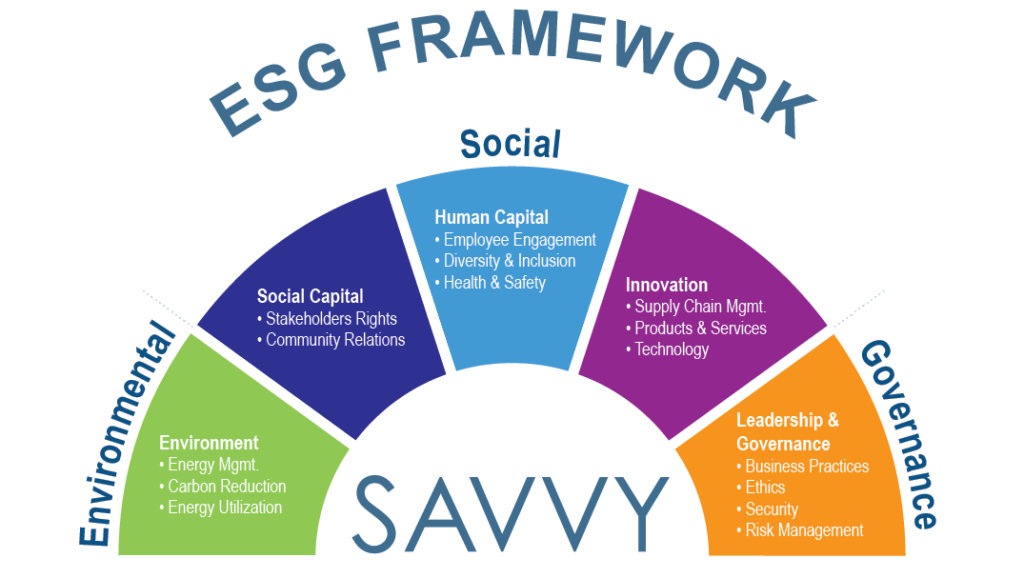ESG DEVELOPMENT
ESG Plan Development- A Business Imperative
It is becoming increasingly important for organizations to focus on Environmental, Social, and Governance (ESG) planning. Now more than ever, investors, employees, and customers are placing a spotlight on companies’ ESG strategies, practices, and performance when deciding where and with whom to partner or invest. Every business is deeply intertwined with environmental, social, and governance (ESG) concerns. It makes sense, that a strong ESG proposition can create value. More often customers, especially publicly traded companies, are demanding their service companies have an ESG plan in place to support their ESG efforts and corporate values. In addition, capital markets and private equity firms are more deeply committed to investing in companies with strong ESG policies.
A strong ESG proposition helps companies penetrate new markets and expand into existing ones.
ESG Principles
Environmental, Social and Corporate Governance
Environmental, Social, and Corporate Governance is an evaluation of a firm’s collective thoughts for social and environmental factors inclusive of how the organization governs itself. It is typically based on achievable goals that are measurable and creates a sustainable organization with dedicated, focused stewardship of ESG as a governing policy.
What Are Environmental, Social, and Governance (ESG) Criteria?
Environmental, social, and governance (ESG) criteria are a set of standards for a company’s operations that socially conscious stakeholders use to screen companies as service suppliers, employers, environmental leaders etc. Environmental criteria consider how a company performs as a steward of nature and reduces its carbon footprint. Social criteria examine how it manages relationships with employees, suppliers, customers, and the communities where it operates. Governance deals with a company’s leadership, workplace diversity, corporate policies, audits and internal controls, and stakeholder rights.
Types of Environmental, Social, and Governance (ESG) Criteria
There are three primary parts to ESG —the environmental, social, and governance aspects.
Environmental
Environmental criteria will include a company’s energy use, waste, pollution, and natural resource conservation. The ESG criteria is intended to showcase how an organization reduces use of carbon, waste and other aspects of environmental impact.
There might be issues related to its disposal of hazardous waste, its management of toxic emissions, or its compliance with government environmental regulations inclusive of working on both client’s sites and their own.
Social
Social criteria reviews company’s business relationships with all employees and stakeholders. Does it engage with suppliers that hold the same values? Does the company contribute to the local community or encourage employees to perform volunteer work there? Do the company’s working conditions show high regard for its employees’ health and safety? Are other stakeholders’ interests taken into account? What is the approach regarding Indigenous relationships?
Governance
Stakeholders will want to know that a company uses accurate and transparent accounting methods. Safe workplace programs and robust practices inclusive of solid systems and processes that protect employees while keeping organizational sustainability.
They may also want assurances that companies avoid conflicts of interest in their choice of leaders, utilize a strong criterion of ethical practices and, of course, don’t engage in illegal practices.
Savvy ESG Advisory Service
- Creation of a solid ESG plan is complex and can be daunting for organizations not well versed in the development of an ESG program. Where do you start, what’s the process, who’s involved, how do you use ESG to create organizational value. Can it create sustainability and how do you measure progress toward your goals?
- The advisors at Savvy can assist in the development of an ESG plan and can provide guidance to your team on all associated aspects. Each company is different in what they do, how they operate, their social conscience, stewards of the environment, etc. so there is no “one size fits all” approach. Your ESG plan will have similar aspects to other organizations but will also have things unique to your company.
- Savvy Advisors utilize a multi-step program that ensures we understand the organizations current state and your future goals as it relates to a comprehensive ESG plan development. We will work with your team to help fill in the gaps, guide and steward an ESG plan you will be proud of and can utilize for years to come. We are well versed in how to facilitate your team’s development of an ESG plan.
Key Aspects of Strong ESG development
- ESG plan development
- Utilizes and combines existing programs with new initiatives
- Goal setting
- How to measure progress
- Continuous stewardship
- Multi-year continuous progress and improvement
- Long term sustainability
- Communication internal and external

